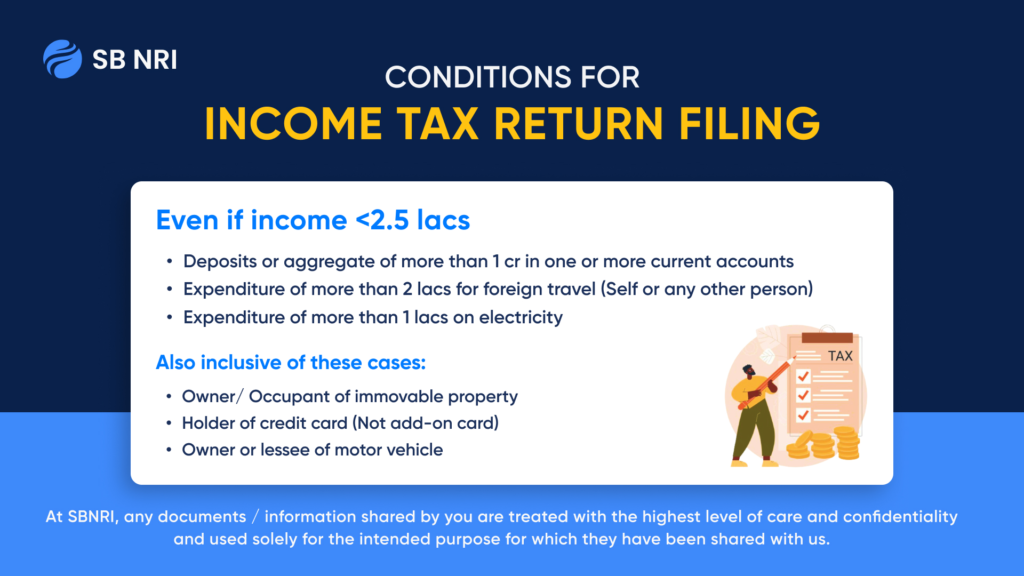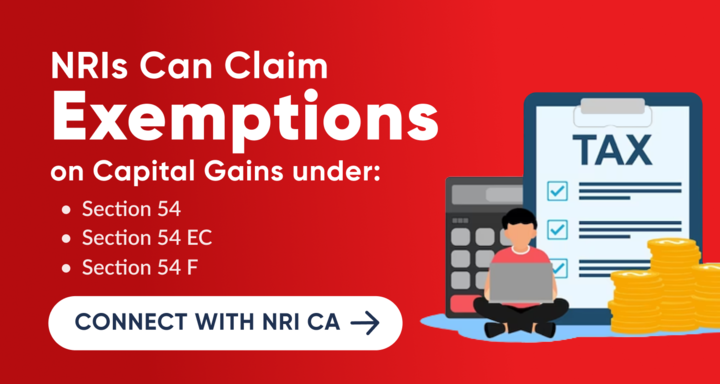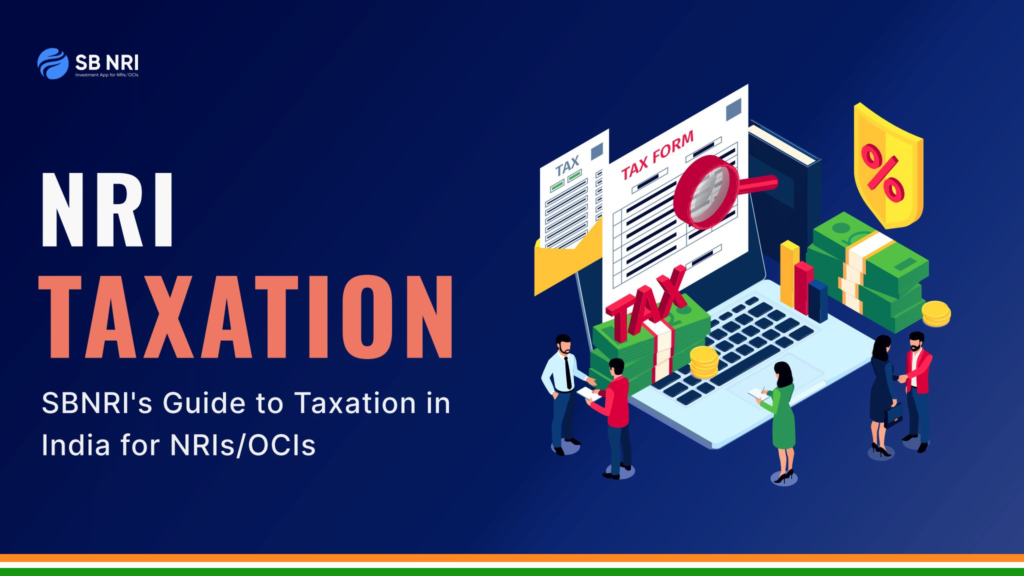
Income Tax for NRI is quite a complex subject. We receive numerous tax queries every day and one such query of NRIs concerning NRI Tax is the process of e-verifying their returns. In this blog post, we will discuss how NRIs can e-verify IT return from abroad, and the steps that need to be taken to ensure that the process is smooth and hassle-free.
Click on the button below to file your ITR in a hassle-free way.
How can NRIs e-Verify IT Return from Abroad?
NRIs are often in a dilemma as to how to file their returns. This is because the e-verification involves the use of OTP (One-Time Password) and messages cannot be delivered abroad. However, there is a solution to it. NRIs can file their income tax return online from wherever they are based and verification of IT return can be done via netbanking, which does not require an OTP.
Also read: ITR Filing for NRIs AY 2024-25: Step-by-Step ITR Filing Process

Steps to File ITR for NRIs
Given below are the steps to file income tax return for NRIs:
Determine your Residential Status
- The first step in filing income tax returns by NRIs is to determine their tax residency status. This has to be determined with respect to a financial year. The residential status is determined u/s 6 of the Income Tax Act 1961. NRIs are individuals who do not reside in India for more than 182 days in a financial year or do not reside in India for 60 days or more during the previous year and 365 days or more during the four preceding years.
Reconciliation of income and taxes with Form 26AS
- Under tax treaties, NRIs are eligible to receive benefits, and they can also claim refunds if their income has had TDS (Tax Deducted at Source) deducted. To do so, they must ensure that the TDS credit and advance tax reported in Form 26AS are reconciled.
Calculate your Taxable Income
- NRIs are subject to taxes in India on various types of income, including interest earned on NRO accounts, capital gains or dividends from Indian shares, and rental income from property. Further, eligible deductions, such as those under section 80C, can be applied to reduce the taxable income.
Determining Tax Liability
- The tax obligation for NRIs is established as per the NRI tax slab rates that are relevant to individuals, with a basic exemption limit of Rs 2.5 lakh applicable to all NRIs prior to the application of deductions or exemptions.
Claim DTAA Benefit
- Double Tax Avoidance Agreement (DTAA) allows NRIs to avoid dual taxation on the same income. Under the DTAA, income may be either exempt from tax deduction in one country or taxed at a reduced rate in the home country. For example, if you have already paid tax in India, you may obtain a tax credit in your country of residence, which will be based on the tax paid on the same income.
Verify IT Returns
- After filing the income tax return form, it is essential that you verify the income tax return within a period of 30 days.
How can NRIs e-Verify IT Return from Abroad? In Detail
Given below are the steps for NRIs to e-Verify IT Return from Abroad through Net Banking:
- To begin with, log into your e-filing account on the website of the IT Department.
- Once you’re logged in, you’ll be taken to your dashboard. From there, navigate to the e-file section and choose ‘Income Tax Returns’.
- Finally, select ‘e-verify return’ to proceed.
- There will be a list of returns that will appear on the screen. You need to select the ITR to be verified.
- Then, select the option of ‘Net Banking’ by clicking on the button ‘Through Net Banking’.
- After clicking on the button, choose the bank with which you want to verify your income tax returns.
- Next, you will be redirected to the Net Banking page where you need to log in to your account using your net banking user ID and password.
- Under the ‘Tax’ tab, select the ‘e-Verify’ option.
- After this, you will now be redirected and logged in to the e-filing portal.
- You then need to select the relevant ITR and click on the ‘e-verify’ button.
- Your tax return will be e-verified successfully. You will receive a confirmation message on your e-mail id and mobile number registered on the income-tax portal.
Also read: New vs Old Tax Regime: Which is better for NRIs/OCIs

Taxable Incomes of NRIs
Given below is the list of taxable incomes of NRIs in India:
- Salary received in India.
- Salary received for services in India.
- Rental income received from a property in India.
- Capital gain if there is any transfer of property or asset in India.
- Income from deposits in India.
- Interest received on savings bank accounts, etc.
Also read: New Rules for NRI Taxation in India FY-2023-24
Income Tax Applicability for NRIs
If you reside and work abroad, your tax liability as an NRI will depend on your residential status for the year. Residential status of an individual is divided into three categories – Resident and Ordinarily Resident (ROR), Resident but Not Ordinarily Resident (RNOR) and Non-Resident (NR). The scope of taxation in India based on the residential status of an Individual would be as under:
| Particulars | ROR | RNOR | NR |
|---|---|---|---|
| Income received or considered to be received in India | Taxable | Taxable | Taxable |
| Income earned or accrued in India | Taxable | Taxable | Taxable |
| Income that accrues outside India from: – Business controlled in India or profession established in India – Other income | Taxable Taxable | Taxable Nontaxable | Nontaxable Nontaxable |
Do NRIs have to File Income tax Returns in India?
NRIs (Non-Resident Indians) are required to file an Income Tax Return (ITR) in India if their income in India exceeds the basic exemption limit of Rs 2.5 lakh in a financial year. NRIs must also file ITR in India if they have earned income from India that is subject to TDS (Tax Deducted at Source) but their total income is below the basic exemption limit. Additionally, if an NRI wishes to claim a refund for any TDS deducted, they must file an ITR.

Due Date for ITR Filing
The due date for filing your ITR is typically July 31st of the assessment year. However, this date can be extended by the government. It’s important to file your ITR before the due date to avoid penalties and interest on any unpaid taxes.
Also read: Penalty for Non-filing of ITR by Due Date: Know all the Rules

Is Verification of ITR Necessary?
Yes, verification of Income Tax Returns (ITR) is a crucial step. NRIs need to verify it to complete the return filing process. If NRIs fail to verify it within the stipulated time, an ITR is treated as invalid.
Also read: How long does it take for Income Tax Refund?
Calculate your TDS Refund with SBNRI’s TDS Refund Calculator
A TDS refund is the process of reclaiming the excess tax deducted at source by the payer if the actual tax liability of the taxpayer is lower than the TDS deducted. This situation typically arises when the income tax calculated on the total income is less than the TDS already deducted. To claim a TDS refund, taxpayers need to file an income tax return (ITR). The Income Tax Department processes the ITR and verifies the details. If the tax department finds that the TDS paid is more than the actual tax liability, the excess amount is refunded to the taxpayer.
You can easily find out how much tax refund you can get by calculating your TDS Refund from this TDS Refund Calculator.
Access SBNRI’s Exclusive NRI Taxation Guide

NRIs and OCIs can now access SBNRI’s exclusive NRI Taxation Guide covering in-depth information about DTAA, Gift Tax, Rental Income Tax, ITR Filing, Types of ITR Forms for NRIs, Capital Gain Tax, Income Tax, and more. The report will help you understand India taxation on mutual funds, other asset classes and how you can comply with the regulations.
Access NRI Taxation Guide here
Looking for NRI ITR Filing? Connect with SBNRI NRI Tax Expert CA Today!

At SBNRI, we have simplified ITR filing for NRIs/OCIs through a smooth digital journey. Be it Basic Filing, Advanced Filing (includes Capital Gain, etc.), or Premium Filing (Foreign Income), we can help you assess the right computation and lower your tax liability.
“We’ve helped over 500+ NRIs/OCIs file ITR returns and more than 25,000+ across other taxation services last financial year and we’d love to help you out too”
You can download SBNRI App or connect with NRI Tax Expert team directly via the button below.
FAQs
How to save on taxes in India by NRI?
NRIs can save on taxes in India by utilizing several deductions and benefits. They can claim a standard deduction of 30% and deduct property taxes and interest from a home loan.
Should NRIs file tax returns in India?
NRIs should file income tax returns in India if they earned income in India during the financial year. Their tax liability depends on their residential status.
What are 120 days rules for NRIs?
The 120 days rule for NRIs states that if they spend more than 120 days but less than 182 days in India and their total income from India is ₹15 lakh or more, they are considered “resident but not ordinary resident” (RNOR).
How to avoid TDS for NRI?
- One way is by opening a specific bank account like:
- A Non-Resident Ordinary Rupee Account (NRO)
- A Foreign Currency Non-Resident Account (FCNR)
- A Non-Resident External Account (NRE)
What is the rule for NRI in ITR?
If the annual returns for NRIs cross the basic exemption limit of Rs 2.5 lakh, NRIs should file their return. However, there are cases where the NRIs/OCIs need to file their return even if their income is less than Rs 2.5 lakh. Here are those cases:
- If you have deposits or aggregate of more than 1 cr in one or more current accounts
- If you spend more than 2 lacs on foreign travel
- If you spend more than 1 lacs on electricity expenditure
What is the penalty for not declaring NRI status?
There is no penalty for not declaring NRI status. However, we advise you to update your NRI status on the IT portal and also close your resident savings account. This will help you to avoid any discrepancies from the IT department and also help you comply with the regulations.
Do NRIs pay capital gains tax?
Yes, capital gains tax provisions for an NRI are similar to those for a resident individual except for the applicability of TDS provisions. Like resident investors, capital gains tax for an NRI depends on the holding period and the type of property sold.
How long can I maintain NRI status after returning to India?
For RNORs returning to India, they can retain their RNOR status for up to 3 years after their return. During this period, any income earned in India will be taxable, while income earned abroad will not be taxable, similar to the tax treatment for NRIs, for those 3 years post-return.
What is the 4 year rule of NRI?
An individual is considered an NRI under the Income Tax Act if they have been in India for fewer than 182 days in the preceding financial year, or if they have been in India for fewer than 60 days during the previous year and 365 days or less over the past four years.
What is the 182 days rule for NRI?
NRI can stay in India for more than 182 days during a financial year. However, doing so will change their residential status from NRI to resident. In other words, to retain NRI status, an individual must stay in India for fewer than 182 days in a financial year.
What is the 240 days rule for NRI?
The 240 days rule for NRI refers to a provision introduced in the Finance Act 2020. According to this rule, an individual will be considered an NRI if they stay in India for 240 days or less during a financial year, provided they also meet certain other conditions related to previous years’ stays in India. This amendment was made to provide more clarity and flexibility for determining NRI status, ensuring that individuals who spend a significant portion of the year outside India are not taxed as residents.
When is the last date to file an income tax return in India for NRIs?
NRIs need to file income tax returns in India before 31st July without any penalty, unless the government extends the last date.
Is NRI subject to capital gains tax on sale of a flat owned by him/her in India?
Yes. An NRI seller is liable for capital gains tax in India upon the sale of their property. The purchaser needs to deduct taxes on sale consideration. The tax deduction rate for a long-term capital gain is 20% plus applicable surcharge and cess. On a short-term capital asset, tax is deductible at 30% plus applicable surcharge and cess. However, there is a provision under the law wherein you can apply for a lower TDS certificate.
Can NRIs continue to use their resident savings account?
As per the regulations of the Foreign Exchange Management Act (FEMA), it is prohibited for non-residents to maintain resident savings accounts in India. Therefore, it is necessary to convert your resident savings account into an NRO (Non-Resident Ordinary) account. Failure to comply with this requirement and continuing to use the resident account may result in significant penalties being imposed.
How can NRIs benefit from Double Tax Avoidance Agreement (DTAA)?
NRIs have two avenues to benefit from double taxation relief, as outlined below:
- Tax Credit Method: In the Tax Credit Method, the home country allows the NRI to claim a tax credit for the tax paid in the source country where the income is earned.
- Tax Exemption Method: In the Tax Exemption Method, the income is taxed in one country and exempted from taxation in another country.
Do NRIs need to be present in India to file an ITR?
No, it is not true. NRIs can easily file and validate their income tax returns online from anywhere in the world.
Do NRIs need to pay advance tax?
If their tax liability exceeds Rs. 10,000 in a financial year, NRIs have to pay advance tax. Under Section 234B and Section 234C, interest will be applicable if you don’t pay your advance tax.
Is there any income tax for NRI in India?
An NRI’s income which is earned or accrued in India is taxable in India. The income earned outside India by an NRI is not taxable in India. Interest earned on NRE and FCNR savings and fixed deposit accounts is tax-free in India. However, interest earned on an NRO account is taxable.
What is the income tax rate for NRIs?
NRI income tax rates are mentioned in the first table in this blog along with the NRI income tax slabs.
When should an NRI file an income tax return in India?
Like resident taxpayers, an NRI must file his/her return of income in India if his/ her Indian income exceeds Rs. 2.5 lakh for the financial year. The last date for income tax filing for NRIs is 31st July of the assessment year.
Is an NRI subject to capital gains tax if he sells his house property in India?
Yes, an NRI will be liable to pay capital gains tax in India upon the sale of his flat. The buyer must deduct taxes on the quantum of gains made by an NRI. The tax deduction rate for a long-term asset would be 20%.
Can NRI claim TDS refund?
If an NRI files Income Tax Return (ITR) after the termination of the financial year in India, they can claim on the deducted TDS. NRI will need to compute his/ her income and tax liability as per the existing slab rates to claim a refund on the TDS.
Is TDS applicable to NRIs?
Interest earned on NRE and FCNR accounts is tax-free in India. Hence there is no TDS. However, interest earned on an NRO account is taxable and will be subject to a TDS of 30%. Other incomes like capital gains, fees for professional services, rental income, etc. may also be liable to TDS.
How can NRI avoid TDS?
An NRI can reduce the TDS liability on sale of his/ her property. The NRI needs to file an application in Form 13 with the Income Tax Department for issuance of certificate for lower or Nil deduction of TDS.
Can NRI claim deductions under Section 24?
NRIs can get tax deductions if they have some taxable income in India. They can claim deductions on the repayment of principal and interest components from the taxable income u/s 24, 80C and 80EE of the Income Tax Act.
Is new tax regime applicable to NRIs?
Yes new tax regime is applicable to NRIs. The new tax regime allows the basic exemption to Rs. 3,00,000. However, NRIs can’t claim the rebate on full tax for income up to Rs. 7 lakh.
What is the 80C limit for 2023-24 for NRIs?
Section 80C enables NRIs to lower their taxable income by a maximum deduction of ₹ 1.5 lakh. This deduction can be achieved by making tax-saving investments, such as paying life insurance premiums, expenses like school tuition fees. However, if NRI taxpayers choose the new tax regime, they are not permitted to claim this deduction.



